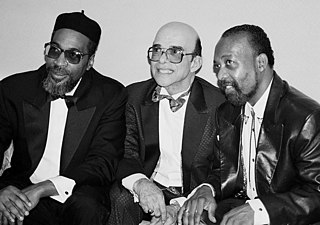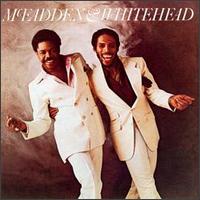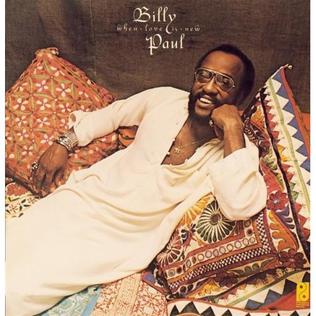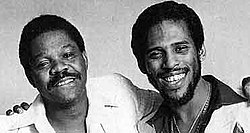
Kenneth Gamble and Leon A. Huff are an American songwriting and production duo credited for developing the Philadelphia soul music genre of the 1970s. In addition to forming their own label, Philadelphia International Records, Gamble and Huff have written and produced 175 gold and platinum records, earning them an induction into the Rock and Roll Hall of Fame in the non-performer category in March 2008.
Philadelphia International Records (PIR) was an American record label based in Philadelphia, Pennsylvania. It was founded in 1971 by songwriting and production duo Kenneth Gamble and Leon Huff along with their longtime collaborator Thom Bell. It was known for showcasing the Philadelphia soul music genre that was founded on the gospel, doo-wop and soul music of the time. This sound later marked a prominent and distinct era within the R&B genre. During the 1970s, the label released a string of worldwide hits that emphasized lavish orchestral instrumentation, heavy bass and driving percussion.
John Cavadus Whitehead was an American singer and songwriter. He was best known as one of the key members of the Philadelphia International record label, and was one-half of the successful team of McFadden & Whitehead with Gene McFadden.
Gene McFadden was an American singer, songwriter, and record producer. He is best known as one of the key members of the Philadelphia International record label, and was one-half of the successful team of McFadden & Whitehead with John Whitehead.

Paul Williams, known professionally as Billy Paul, was an American soul singer, known for his 1972 No. 1 single "Me and Mrs. Jones". His 1973 album and single War of the Gods blends his more conventional pop, soul, and funk styles with electronic and psychedelic influences.

Beatrice Melba Hill or Beatrice Melba Smith, known by her stage name Melba Moore, is an American singer and actress.

Wake Up Everybody is an album released by Harold Melvin & the Blue Notes on the Philadelphia International record label in November 1975. It was produced by Kenneth Gamble & Leon Huff. This would be the last album to include Teddy Pendergrass before he left the group for a solo career.
Walter "Bunny" Sigler was an American R&B singer, songwriter, multi-instrumentalist and record producer who did extensive work with the team of Kenny Gamble and Leon Huff, and was instrumental in creating the "Philly Sound" in the early 1970s.

Earl Donald Young is a Philadelphia-based drummer who rose to prominence in the early 1970s as part of the Philly Soul sound. Young is best known as the founder and leader of The Trammps who had a hit record with "Disco Inferno". Young, along with Ronnie Baker and Norman Harris, was the owner of the Golden Fleece record label.

"Wake Up Everybody" is an R&B song written by John Whitehead, Gene McFadden and Victor Carstarphen.

"Ain't No Stoppin' Us Now" is a 1979 disco song performed by American R&B duo McFadden & Whitehead, from their debut album McFadden & Whitehead. They wrote and produced the song along with keyboard player Jerry Cohen.
The Dresden Soul Symphony is a German concert show. The musicians reinterpret soul hits and combine them with classical music. The musical ensemble contains the singers Joy Denalane, Bilal, Tweet and Dwele; the radio orchestra of the Mitteldeutscher Rundfunk; four backing vocalists; the MDR children's choir and four instrumentalists, who do not belong to the orchestra. The performance venue of the show is Dresden, Germany. The premiere was on April 26, 2008.

"Bad Luck" is a song recorded by American vocal group Harold Melvin & the Blue Notes from their album To Be True. Released as a single in 1975 by Philadelphia International Records, the song was written by Victor Carstarphen, Gene McFadden, and John Whitehead and produced by Gamble and Huff, with MFSB providing instrumentals. The single was number one on the Billboard Disco Action chart for eleven weeks, also peaking at no. 4 on Hot Soul Singles and no. 15 on the Hot 100. With an unusually loud hi-hat by session drummer Earl Young, "Bad Luck" is considered a signature disco song.
Lloyd Parks is an American R&B/soul singer born in Philadelphia, Pennsylvania, United States. He is an original member of the Philadelphia International Records group, Harold Melvin & the Blue Notes. Lloyd is noted for his high tenor and falsetto vocal leads and harmonies. He is also a founding member of the Epsilons who backed Arthur Conley on his Atco Records hit single "Sweet Soul Music".

McFadden & Whitehead is the debut album of the R&B duo of the same name, released in 1979. The album peaked at #5 on the R&B charts and #23 on the Billboard 200. The lead single "Ain't No Stoppin' Us Now" topped the R&B charts, was #10 on the disco charts, and peaked at #13 on the Hot 100. The song "I've Been Pushed Aside" peaked at #73 R&B.

Melba is the eighth album by singer Melba Moore, released in 1978.
"You Stepped into My Life" is a song released by the Bee Gees in September 1976 on the album Children of the World. It was also released as the B-side of "Love So Right". Written by Barry, Robin & Maurice Gibb.

Reaching for the World is the fifth album by American vocal group Harold Melvin & the Blue Notes. This, their debut album for the ABC Records label, was recorded in 1976 and released in 1977. This is the first album without Teddy Pendergrass, David Ebo was his replacement. Also joining the Blue Notes were Dwight Johnson and William Spratley. On release it reached #56 in the US Billboard 200 and #15 on the US R&B Charts. The lead single was "Reaching For The World" which reached #74 on the US Billboard 100 and #6 on the US R&B Charts. Then "After You Love Me, Why Do You Leave Me", featuring Sharon Paige, reached #102 in the US Billboard 100 and #15 on the US R&B Charts. Hostage Parts 1&2 was chosen as the final single, but failed to chart.

When Love is New is an album by soul singer Billy Paul. It was produced by Kenny Gamble & Leon Huff; arranged by Bobby Martin, Dexter Wansel, Norman Harris, and Jack Faith; and engineered by Joe Tarsia. Released in December 1975, it reached #139 on the Billboard Pop Album chart and #17 on the Soul chart. It includes the singles "Let's Make a Baby" which hit #83 on the Pop singles chart, #18 on the Soul chart, and #30 in the UK and "People Power" which reached #82 on the Soul chart and #14 on the U.S. Dance chart. The album was reissued on CD in 2010 by the U.K.'s Edsel Records. This was the final album where Paul was backed by MFSB, the house band of Philadelphia International Records (PIR).

Dennis Harris is an American session guitarist, songwriter and arranger. Historically he played a significant part in the Philly Sound, playing on many of the hits during the 1970s. The hits include, "Only the Strong Survive" by Billy Paul, "Ain't No Stoppin' Us Now" by McFadden & Whitehead and "Lady Love" by Lou Rawls. He also played the guitar intro on Rawls' hit "You'll Never Find Another Love like Mine". He is a former member of The Philly Groove Orchestra, The Trammps, MFSB and The Salsoul Orchestra. In recent years he has been part of the New MFSB. He is also a guitar teacher.













